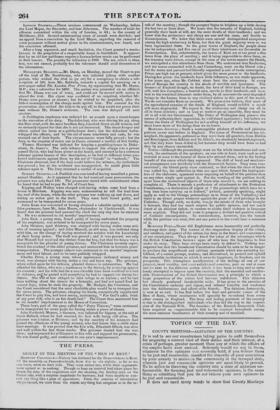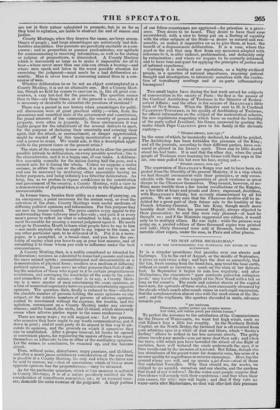COUNTY MEETINGS—AGITATION OF THE COUNTRY.
TOPICS OF THE DAY.
1r is sad to see our countrymen taking pains to unfit themselves for acquiring a correct view of their duties and their interest, at a crisis of perhaps, greater moment than any at which the affairs of the empire have ever arrived. Solemnly would we say to them, whatever be the opinions you severally hold, if you believe them to be just and reasonable, manifest the sincerity of your conviction by your anxiety to maintain the community in the tranquil state, wherein just and reasonable opinions are most likely to prevail. To be active in throwing the country into a state of agitation un- favourable for forming just and reasonable opinions, is the same thing as admitting that you do not believe your own opinions to be just and reasonable.
It does not need many words to show that County Meetings are not in their nature calculated to promote, but, in as far as they tend to agitation, are liable to obstruct the end of reason and justice. County Meetings, when they deserve the name, are large assem- blages of people ; and large assemblages are notoriously bad deli- berative assemblies. Our passions are peculiarly. excitable in a con- course ; and in proportion as passion predominates, our aptitude for communicating or receiving information, as well as for stating or judging of propositions, is diminished. A County Meeting which is necessarily so large as to make it impossible for all to hear—where never more than one side can obtain a hearing—and where men speak and listen in the worst possible situation for exercising the judgment—must needs be a bad deliberative as- sembly. Man is never less of a reasoning animal than in a con- course of men.
Whether deliberation be or be not an object contemplated in a County Meeting, it is not an attainable one. But a County Meet- ing, though no field for reason to exercise in, is, like all great con- courses, a very hot-bed for the passions. The question comes then to this —are these times, or is the present a case, in which it is necessary or desirable to stimulate the passions of mankind ?
There was a period in our history when assemblages for politi- cal discussion were of great practical utility ;—when, from the precarious and unsettled state of the government and constitution, the grand interests of the community,.the security of person and property, were often in jeopardy. In these emergencies it was highly proper for the inhabitants of the several districts to meet, for the purpose of declaring their unanimity and evincing their spirit, that the attack, or encroachment, or danger apprehended, might be warded off by this timely manifestation of a purpose and a power to resist. We would ask, is this a description appli- cable to the present times or the present crisis ?
The state of the country is now so settled as to allow the greatest possible latitude to deliberation, on every possible question ; this is the characteristic, and it is a happy one, of our times. A delibera- tive assembly consults for the nation during half the year, and a council acts for it during the whole. Unless we suppose a maim animus, in either the one or the other, it is not easy to see what end can be answered by instituting other assemblies having no better purposes, and being infinitely less fitted for deliberation. As long, too, as we profess to repose confidence in the constitution and government of the country, a County Meeting, with a view to a demonstration of physical force, is obviously in the highest degree unwarrantable.
In former times, besides their utility as a means of carrying, on an emergency, a point necessary for the instant weal, or even the salvation of the state, County Meetings were useful mediums of diffusing political opinions and information. For this purpose they are now no longer wanted. The press carries every appeal to the understanding home to:every man's fire-side ' • and puts it in every man's power to reflect on what is submitted to him, at a moment most favourable for passing a correct judgment upon it. He needs not go to Penenden Heath to learn what people have to say to him —nor needs anybody who has aught to say repair to the same, or any other particular spot, to be delivered of it. Put it in a news- paper, or a pamphlet, or a broad-sheet, and you have the cer- tainty of saying what you have to say in your best manner, and of i submitting it to those whom you wish to influence under the best circumstances.
A County Meeting, then, is a nullity considered as intended for deliberation ; noxious as calculated to rouse bad passions and excite the mere animal spirits ; unconstitutional and unwarrantable as a demonstration of physical force ; needless as a medium of diffusing political opinions. It can serve no other purpose than that of affix- ing the sanction of those who repair to it to certain propositions or resolutions, and conveying the knowledge of the same to the rulers and councillors of the nation ;—that is to say, a County Meet- ing is a mere muster of men entertaining the same opinions, or a trial of numerical superiority between parties entertaining opposite opinions. The question, then, finally is reduced to this—whether the absolute number of persons holding the same opinions on any subject, or the relative numbers of persons of adverse opinions, cannot be ascertained without the expense, the trouble, and the agitation, consequent on a County Meeting under any circum- stances; and the tumult, the strife, and ill-blood, which necessarily ensue when adverse parties repair to the same rendezvous ?
There are many ways ; we will suggest one : Let the persons, who conceive they have aught to say worth communicating, put it down in print; and let each party do its utmost in this way to cir- culate its opinions, and the grounds on which it conceives they can be established. After a proper interval, let books be opened at convenient places, for registering the names of those who report themselves as adherents to one or other of the conflicting opinions. Let the names, in conclusion, be summed up, and the balance struck.
Thus, without noise, disturbance, angry passions, and ill-blood, and after a much :more satisfactory consideration of the case than is possible at a County Meeting, the only end which the latter can be said to answer, viz.—that of ascertaining which of two or more opposite opinions has the preponderance,—may be obtained. As for the particular question, which at this moment is agitated in County Meetings, it is of a nature peculiarly unfitted for the consideration of tumultuous assemblies, and, in an especial man- ner, demands the cairn exercise of the judgment. A large portion of our fellow-countrymen are aggrieved—for privation is a griev- ance. They desire to be heard. They desire to have their case reconsidered, with a view to being put on a ',footing of equality with the other subjects of the State—a desire so natural and rea- sonable, as makes it imperative on us to give them, at least, the benefit of a dispassionate deliberation. It is a case, where the good or the evil that may flow from any measures adopted with reference to it, is alike indirect, problematical, and deducibly only by ratiocination ; and where we require to be correctly informed, and to have time and quiet for applying the principles of justice and of national expediency.
Certainly it is worthy of our reputation, as a highly civilized people, in a question of national importance, requiring patient thought and investigation, to intoxicate ourselves with the excita- tion of tumultuary meetings and of ex-parte inflammatory harangues !



















 Previous page
Previous page